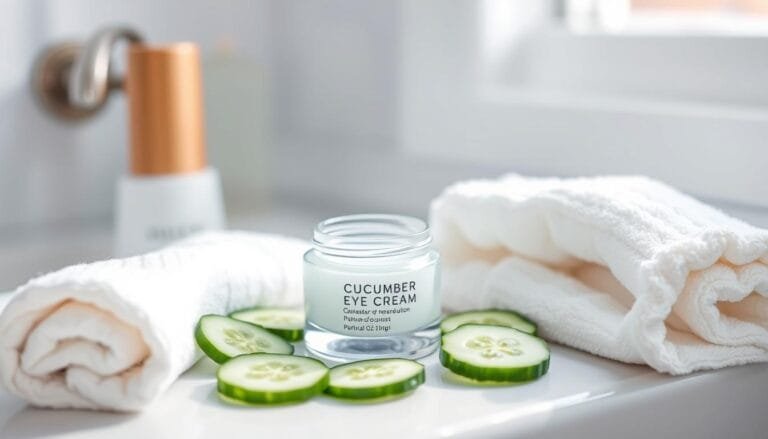I’ve struggled with sleep issues and found chamomile tea to be a game-changer. It’s known worldwide for its gentle sleep aid properties. If you have insomnia or just want better sleep, chamomile might be what you need.
Chamomile gets its name from the Greek words for “ground apple,” thanks to its sweet smell. German and Roman chamomile are the most used types for sleep and health. They’ve been treating sleep issues like insomnia and nightmares for centuries.
So, why is chamomile so good for sleep? It’s because of a chemical called apigenin. This compound works like some prescription drugs to calm the brain and help you sleep better.
Understanding the Science Behind Chamomile’s Sleep-Promoting Properties
Chamomile is a well-known herbal remedy for sleep. Its secret is a compound called apigenin, a flavonoid found in the plant. Apigenin works like prescription sleep meds by binding to brain receptors.
This interaction relaxes the brain, making it easier to fall and stay asleep. Chamomile also boosts glycine, a neurotransmitter that acts as a natural sedative. This boosts its sleep-promoting effects.
The Role of Apigenin in Sleep Regulation
Apigenin, the key compound in chamomile, is an antioxidant and anti-inflammatory. It binds to benzodiazepine receptors in the brain, which control sleep. This action helps start sleep and improve its quality.
How Chamomile Affects Brain Chemistry
Chamomile’s sleep benefits extend beyond benzodiazepine receptors. It also raises gamma-aminobutyric acid (GABA) levels, a neurotransmitter that calms the brain. This helps induce a restful night’s sleep.
Research-Backed Evidence on Sleep Benefits
Scientists have studied chamomile’s sleep benefits a lot. A meta-analysis of 12 trials showed it improves sleep quality, mainly in those with insomnia. It also helps with daytime functioning and sleep in women during menopause and after childbirth.
“Chamomile is one of the richest natural sources of apigenin, which is likely responsible for its sedative effect.”
Adding chamomile to your bedtime routine can naturally improve your sleep and well-being.
The Historical Background of Chamomile as a Sleep Aid
Chamomile comes from Greek words meaning “ground apple.” It’s been a key part of traditional medicine for ages. People worldwide, mainly in tea form, have used it to relax and sleep better.
Chamomile has helped with many health issues, like colds, sore throats, and anxiety. It’s also good for insomnia, psoriasis, acne, and stomach problems. Studies on animals show it can reduce inflammation and heal wounds.
In the West, chamomile is a top favorite herb. Most Americans use it for anxiety or sleep issues. One study found it helps with mild to moderate anxiety.
“Chamomile has been traditionally used for digestive issues like stomach cramps, IBS, indigestion, diarrhea, gas, and colic. It may also help relieve symptoms of indigestion in combination with other herbs, according to an analysis of several studies.”
Chamomile also helps with skin problems like eczema, studies show. But, it’s not for everyone. People with asthma, pregnant women, or flower allergies should avoid it. It can also affect some medications.

Recent studies back up chamomile’s long history as a sleep aid. It improves sleep quality and helps fall asleep faster. It’s also good for anxiety-related sleep issues.
Different Types of Chamomile and Their Sleep Benefits
Understanding the different types of chamomile is key to better sleep. German chamomile (Chamomilla recutita) and Roman chamomile (Chamaemelum nobile) are two common types used in tea. They both help with sleep but have different chemicals and effects.
German Chamomile vs. Roman Chamomile
German chamomile is the most used in teas and products. It has more apigenin, which calms the brain. Roman chamomile is often used in essential oils and has a different chemical makeup.
Chamomile can also ease menstrual pain, lower blood sugar, and fight cancer cells. Its flavonoids are anti-inflammatory, helping with many health issues.
Identifying Quality Chamomile Products
Choosing the right chamomile for sleep is important. Look for pure, high-quality products without additives or caffeine. Trustworthy brands with strict quality standards are best for sleep benefits.
The sleep benefits of chamomile also depend on your sleep habits and stress. Adding chamomile to your bedtime routine can enhance its sleep effects.
Using Chamomile for Sleep: Best Practices and Methods
Looking to add chamomile to your sleep routine? Here are some tips. Chamomile is often enjoyed as an herbal infusion or chamomile tea. Steeping it for 15 minutes is best to get the most benefits.
Having a bedtime routine with chamomile tea can really help. A 2016 study showed that drinking chamomile tea after giving birth helped women feel less tired and less depressed.
| Herbal Tea | Key Sleep-Promoting Compounds | Potential Benefits |
|---|---|---|
| Chamomile | Apigenin, a flavonoid that binds to certain receptors in the brain that may promote sleepiness and reduce anxiety | Improved sleep quality, reduced symptoms of insomnia, and decreased physical and mental fatigue |
| Lavender | Linalool and linalyl acetate, which have a calming effect on the nervous system | Enhanced sleep quality, reduced anxiety, and improved relaxation |
| Valerian Root | Valerenic acid, which may increase gamma-aminobutyric acid (GABA) levels in the brain to induce a sense of calm | Reduced time to fall asleep, improved sleep quality, and decreased anxiety |
| Green Tea | L-theanine, an amino acid that promotes relaxation and improves sleep quality | Reduced stress, improved sleep, and enhanced cognitive function |
Using different herbal teas in your sleep routine can help a lot. Each tea has its own benefits. By choosing the right teas, you can make a bedtime ritual that helps you relax and sleep well.

Optimal Timing and Dosage for Sleep Enhancement
Timing and dosage are key when using chamomile for sleep. Drinking chamomile tea a few hours before bed is best. This lets chamomile’s compounds, like apigenin, work to help you sleep well without waking up for the bathroom.
Best Time to Drink Chamomile Tea
Drink chamomile tea in the late afternoon or early evening. This is about 2-3 hours before you want to sleep. It helps you relax without making it hard to fall asleep.
Recommended Serving Sizes
- Most studies say 1-2 cups of chamomile tea is best.
- For supplements, 200mg of chamomile extract twice a day is common.
Duration of Use for Maximum Benefits
Using chamomile regularly for weeks can really help your sleep. Some people see better sleep right away. But, giving your body time to adjust can lead to even better sleep.
“Chamomile has been used for centuries as a natural sleep aid, and modern research has demonstrated its efficacy in promoting restful sleep. By understanding the optimal timing and dosage, you can unlock the full potential of this herbal remedy to enhance your bedtime routine and support a healthy sleep cycle.”
Combining Chamomile with Other Natural Sleep Remedies
Struggling with poor sleep? Mixing chamomile with other sleep herbs might help. Over 60 million Americans face sleep issues, which can lead to serious health problems. Warm milk, chamomile tea, and tart cherry juice might not be backed by science. But, some herbal mixes offer a gentle way to improve sleep.
Lemon balm and lavender can calm you down, working well with chamomile. Valerian root boosts GABA in the brain, helping you relax. Passionflower reduces stress and anxiety, common causes of insomnia.
Always talk to a healthcare provider before trying herbal mixes. Everyone reacts differently to these remedies. So, it’s key to find the perfect mix for you.
Creating a bedtime routine is also important. Include relaxation techniques like deep breathing or meditation. This can boost the sleep benefits of natural remedies. A holistic approach can help you get the restful sleep your body needs.
Potential Side Effects and Safety Considerations
Chamomile is usually safe, but it’s good to know about possible side effects and safety tips. Some people might have allergic reactions, mainly if they’re sensitive to ragweed, chrysanthemums, or other plants in the Asteraceae family.
Who Should Avoid Chamomile
- Pregnant or nursing women should talk to their doctor before using chamomile. It might be risky for the baby or the nursing infant.
- People with kidney or liver disease should be careful. Chamomile might change how some medicines work.
- Those with bleeding problems or taking blood thinners should not use chamomile. It could make bleeding more likely.
Drug Interactions and Precautions
Chamomile can interact with many medicines, including:
- Blood thinners (e.g., warfarin)
- Sedatives and anxiolytics
- Diabetes medications
- Drugs that the liver breaks down
Talking to your doctor about using chamomile is very important, if you’re on any medicines. Also, stop using chamomile two weeks before surgery or dental work to avoid bleeding risks.
Most people find chamomile okay, but some might feel sick, dizzy, or sleepy. Drinking too much concentrated chamomile tea can cause vomiting. Always stick to the recommended amount and ask a doctor if you’re unsure.

“Chamomile has been shown in test tube studies to have antibacterial, antifungal, and antiviral properties and to relax muscle contractions.”
Alternative Forms of Chamomile for Sleep Support
Chamomile is a versatile herb that can help you sleep better. You can enjoy it in many ways, not just as tea. There are other options for those looking for sleep support.
Chamomile Supplements
Chamomile is also available in supplement form, like capsules or tinctures. These products have more of the active compounds that help you sleep. They’re great for those who don’t like drinking tea before bed.
Chamomile Essential Oil
Chamomile essential oil is perfect for aromatherapy. It can make you feel relaxed and calm. Using it in a diffuser or on your skin can help you sleep better.
Topical Chamomile Applications
Some people like to use chamomile on their skin. You can add it to your bathwater or use it in skincare. Its calming and anti-inflammatory effects can help you relax and sleep well.
When looking for alternative chamomile options, think about what you like and what might work for you. Always talk to a healthcare professional to find the best choice for your needs.

“Chamomile is considered safe by the FDA with no known side effects for the treatment of insomnia.”
Creating an Effective Bedtime Routine with Chamomile
Adding chamomile tea to your bedtime routine can greatly improve your sleep. Start by making your bedroom cool (65-72°F), dark, and quiet. Try to avoid screens and use soft lights before bed to help your body make melatonin.
Drink a warm cup of chamomile tea and relax with deep breathing or light reading. These activities help you unwind.
Exercising during the day can help you sleep better, but avoid hard workouts before bed. Going to bed and waking up at the same time every day, even on weekends, helps your body get into a sleep rhythm.
Environmental Factors for Better Sleep
- Maintain a cool, dark, and quiet bedroom environment
- Limit screen time and use low lighting before bed
- Establish consistent sleep and wake times, even on weekends
Complementary Relaxation Techniques
- Drink a warm cup of chamomile tea
- Practice deep breathing exercises
- Engage in light reading before bed
| Ingredient | Benefits |
|---|---|
| Valerian Root | Muscle-soothing spasmolytic properties |
| Lavender | Releases a soothing, pleasant scent |
| Hawthorn Berry | Anti-inflammatory, may ease anxiety and aid digestion |
| Passionflower | Contains mood-boosting neurotransmitters, may help with anxiety, insomnia, and pain |
| Lemon Balm | Relieves stress, induces sleep, and reduces anxiety |
| Hops | Improves the sleep-wake cycle and assists in falling asleep and staying asleep |
| Hemp | Contains cannabinoids like CBD and CBN with relaxing, anti-inflammatory, and antioxidant properties, useful for insomnia and anxiety relief |
By making a bedtime routine with chamomile tea and other relaxation methods, you can improve your sleep. Remember, sticking to a routine is important for good sleep habits.
Additional Health Benefits Beyond Sleep Improvement
Chamomile is more than just a sleep aid. It has anti-inflammatory, diuretic, and pain-relieving qualities. These make it great for keeping you healthy overall.
Studies show chamomile can help with anxiety and menstrual pain. It might also help your heart by lowering disease risk and blood pressure. Plus, it can lower blood sugar in people with type-2 diabetes.
Chamomile’s antioxidants, like quercetin, boost your immune system and might fight cancer. It also soothes your stomach, helping with digestive issues. This makes it good for your digestive health.







